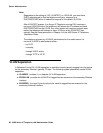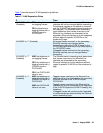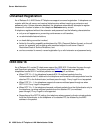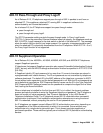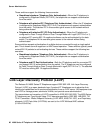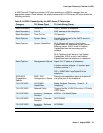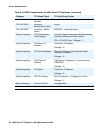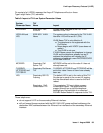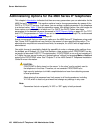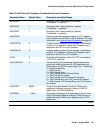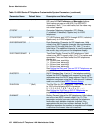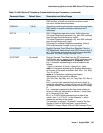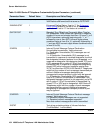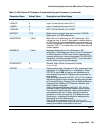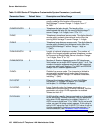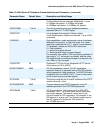
Server Administration
100 4600 Series IP Telephone LAN Administrator Guide
Administering Options for the 4600 Series IP Telephones
This chapter’s Introduction indicates that there are many parameters you can administer for the
4600 Series IP Telephones. This section explains how to change parameters by means of the
DHCP or TFTP/HTTP servers. In all cases, you are setting a system parameter in the telephone
to a desired value. Table 10
lists the parameter names, their default values, the valid ranges for
those values, and a description of each one. For DHCP, the DHCP Option sets these
parameters to the desired values as discussed in DHCP Generic Setup
on page 62. For TFTP
and HTTP, the parameters in Table 10
are set to desired values in the Script File, as discussed
in Contents of the Upgrade Script
on page 81.
Avaya recommends that you administer options on the 4600 Series IP Telephones using script
files. Some DHCP applications have limits on the amount of user-specified information. The
administration required can exceed those limits, for example, for a 4630 with all applications
administered.
You might choose to completely disable the capability to enter or change option settings from
the dialpad, as of Release 1.8. As of that Release, a new system value, PROCPSWD, can be
set as part of standard DHCP/TFTP administration. If PROCPSWD is non-null and consists of 1
to 7 digits, the user cannot invoke any “dialpad options” without first pressing Mute or Hold and
entering the PROCPSWD value. See “Chapter 3" of the 4600 Series IP Telephone Installation
Guide for more information.
!
CAUTION:
CAUTION: PROCPSWD is likely stored on the server “in the clear” and is certainly sent to
the telephone in the clear. Therefore, do not consider PROCPSWD as a
high-security technique to inhibit a sophisticated end-user from obtaining access
to local procedures.
Administering this password can limit access to all local procedures, including
V I E W, which is read-only and would not change any settings in any case.
Note:
Note: Parameters that do not specify “H.323” or “SIP” apply to both protocols.



